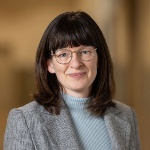Through its "Momentum" funding program, the Volkswagen Foundation supports early-career professors in strategically advancing their research and exploring new areas of inquiry. In April 2025, the foundation approved eleven new projects, including a project by a newly appointed professor at the University of Stuttgart: Prof. Cornelia Monzel's project “The Synthetic Immunological CAR-Synapse - Defining molecular benchmarks for efficient immune cell activation” is being funded with 670,000 euros.
New analytical tools improve diagnosis and treatment of cancer
Cornelia Monzel and her research group have been strengthening the physics and biomedical systems research area at the University of Stuttgart since April. The experimental physicist, formerly a professor at Heinrich Heine University in Düsseldorf, aims to gain deeper insights into how signals develop within cells. Cell signals are biochemical communication processes that control the human immune system, among other things. “To understand how a signal to activate an immune cell is generated, you have to look at the single-molecule, nanoscale level,” says Monzel. “My working group at the 2nd Institute of Physics is developing novel, extremely high-resolution microscopic and spectroscopic analysis methods for this purpose. These can be used to map the molecules involved in the signal and measure their interaction.”
The application-oriented project, which is funded by the VW Foundation, aims to improve the diagnosis and treatment of cancer. The researchers are focusing in particular on the revolutionary CAR-T cell therapy. "T cells play a key role in the immune system by identifying and eliminating abnormal cells. To do this, they scan the cell surface for certain molecules and cell signals,” explains Monzel. “The problem is that cancer cells can develop strategies to hide from T cells. In CAR-T cell therapy, the T cells are genetically modified so that they can unmask and fight cancer cells. This therapeutic approach represents a groundbreaking advance in oncology.”
Further developing revolutionary CAR-T cell therapy
CAR-T cell therapy is already being used successfully for hematological diseases such as leukemia, but now the strategy needs to be extended to solid tumors. “We want to develop refined testing methods that analyze and evaluate the recognition of the tumor cell by the CAR immune cell. To this end, the molecular structures for signal generation are evaluated using imaging spectroscopic data.” To achieve this, Monzel's research group relies on interdisciplinary expertise in optics, biophysics and bioinformatics. The Stuttgart team will also work closely with doctors from the university hospitals in Düsseldorf and Essen.
In addition to innovative imaging spectroscopic analysis methods, the team is also developing simplified, synthetic tumor cell surfaces. “These models make it possible to quickly simulate different scenarios on the tumor cell membrane. Furthermore, the molecular structures can be specifically varied in order to identify key elements for signaling in the CAR immune cell.”
Promoting Open Science: Focus on user-friendliness
In line with the motto 'Creating knowledge, sharing knowledge', the topic of open science plays a central role in Monzel's research. “We want to make our analysis methods available to other researchers and for medical applications. In addition to applications like preclinical and diagnostic testing, we aim to develop automated, intelligent analysis routines that are especially user-friendly. We will make these available via Github, Zenodo or similar platforms.”
Strategic profile area Biomedical Systems and Robotics for Health
Contact

Lena Jauernig
Editor Research / Early Career Researchers



